I am trying to send a GET request to my python flask server (running on 127.0.0.1:5000) from my javascript page (running on 127.0.0.1:80)
Python Flask server
import classifyGrade
from flask import Flask
from flask import request
from flask import Response
from flask import jsonify
import json
app = Flask(__name__)
@app.route('/')
def classify():
... function ...
return response
if __name__ == '__main__':
app.run(host='0.0.0.0',port=5000,debug=False)
Javascript
function getClassification()
{
const modulesArray = [
document.getElementById('module_1').value,
document.getElementById('module_2').value,
document.getElementById('module_3').value,
document.getElementById('module_4').value,
document.getElementById('module_5').value
]
const marksArray = [
document.getElementById('mark_1').value,
document.getElementById('mark_2').value,
document.getElementById('mark_3').value,
document.getElementById('mark_4').value,
document.getElementById('mark_5').value
]
let module_1 = document.getElementById('module_1').value
let module_2 = document.getElementById('module_2').value
let module_3 = document.getElementById('module_3').value
let module_4 = document.getElementById('module_4').value
let module_5 = document.getElementById('module_5').value
let mark_1 = document.getElementById('mark_1').value
let mark_2 = document.getElementById('mark_2').value
let mark_3 = document.getElementById('mark_3').value
let mark_4 = document.getElementById('mark_4').value
let mark_5 = document.getElementById('mark_5').value
let xhttp = new XMLHttpRequest();
xhttp.onreadystatechange = function() {
if (this.readyState == 4 && this.status == 200) {
var j = JSON.parse(this.response);
}
};
/*
xhttp.open("GET",classifyModulesURL+"?module_1=" + module_1 + "&mark_1=" + mark_1 + "&module_2=" + module_2 + "&mark_2=" + mark_2
+ "&module_3=" + module_3 + "&mark_3=" + mark_3 + "&module_4=" + module_4 + "&mark_4=" + mark_4
+ "&module_5=" + module_5 + "&mark_5=" + mark_5);
console.log("Request Sent: "+"GET"+classifyModulesURL+"?module_1=" + module_1 + "&mark_1=" + mark_1 + "&module_2=" + module_2 + "&mark_2=" + mark_2
+ "&module_3=" + module_3 + "&mark_3=" + mark_3 + "&module_4=" + module_4 + "&mark_4=" + mark_4
+ "&module_5=" + module_5 + "&mark_5=" + mark_5);
*/
xhttp.open("GET",classifyModulesURL+"?modules="+modulesArray+"&marks="+marksArray);
xhttp.send();
//POST Attempt
//xhttp.open("POST",classifyModulesURL);
//xhttp.setRequestHeader("Content-Type", "application/json;charset=UTF-8");
//data = JSON.stringify({"modules": modulesArray, "marks": marksArray};
//xhttp.send(data);
return;
}
I expect that my flask server returns the JSON response. It works when I do a request through postman:
But when I do it through the Google Chrome Browser I get this error:
Error in text:
Access to XMLHttpRequest at 'http://127.0.0.1:5000/?modules=CSC3021,CSC4302,CSC3299,CSC5678,CSC7623&marks=45,66,43,54,78' from origin 'http://127.0.0.1' has been blocked by CORS policy: No 'Access-Control-Allow-Origin' header is present on the requested resource.
I have tried:
- Changing the port of the flask server
- Importing flask_cors and trying to setup cors.
I do not want CORS on my flask server if possible. I just want to get the response from my GET command. Trying to keep things simple.
Is it something to do with my browser?

